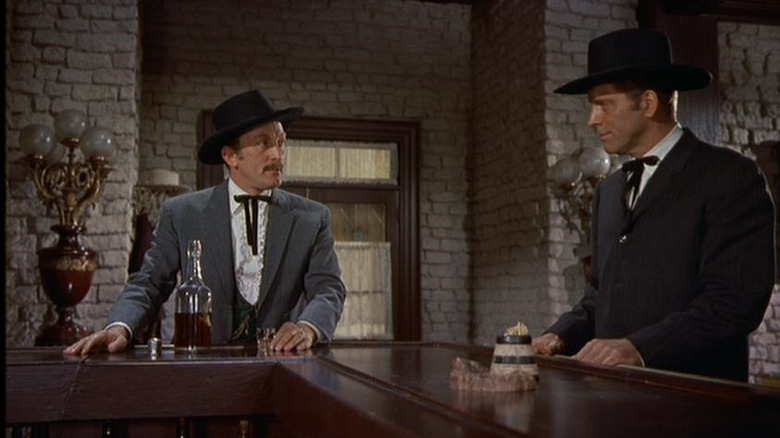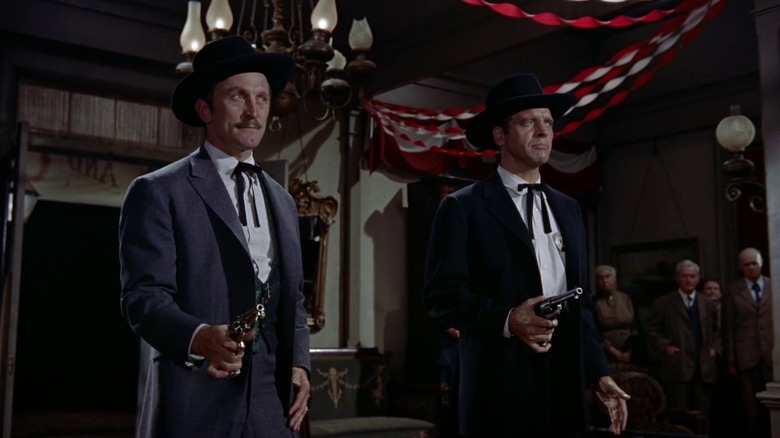Casting Burt Lancaster Was A Requirement To Get Kirk Douglas For Gunfight At The O.K. Corral
For Kirk Douglas, "Gunfight at the O.K. Corral" was a breath of fresh air amid military man roles in the likes of "Top Secret Affair" and Stanley Kubrick's "Paths of Glory." Opposite Burt Lancaster's mythical lawman Wyatt Earp, gunslinger Doc Holliday was resolute but ill, a former dentist with a telltale cough that followed him throughout the 122-minutes of runtime. In his autobiography "The Ragman's Son," Douglas makes it clear that he was into Leon Uris' script not so much as a loose historical account but as "an interesting relationship between two men."
Both men –- Lancaster and Douglas –- had some history with "Gunfight" producer Hal Wallis, whose Best Picture Academy Award for "Casablanca" had been on his mantle for over a decade by this time. The pair previously starred in Byron Haskin's '47 noir classic "I Walk Alone," backed by Wallis. Wallis eventually parted ways with Douglas as the latter's banner Bryna Productions began to grow; in Douglas' words, "[Wallis] had dropped me years ago because I would not sign a term contract." The severance didn't look so bad in retrospect, though; now, Douglas was being offered "10 times" the salary he would have otherwise earned under contract. Lancaster, however, was still contractually tethered to Wallis. Douglas recalls:
"I said I would play Doc Holliday (Wallis had been trying to get [Humphrey] Bogart) if Burt Lancaster would play Wyatt Earp. Burt was still under contract to Wallis, with one more picture to go. I think Burt had no particular desire to play Wyatt Earp, but with me playing Doc Holliday and the picture finishing off his contract with Wallis, that was all the inducement he needed. So he agreed to play Wyatt Earp, the lawman, and I played Doc Holliday, the gunslinger with 30 notches on his belt."
Friendliness before and behind the camera
Kirk Dogulas goes on to clarify that while he and Burt Lancaster had worked together on "I Walk Alone" a decade prior, it was on the Paramount Ranch sets of "Gunfight at the O.K. Corral" that they grew closer as friends:
"After the day's shooting in Tucson, and dinner at the hotel, we would just sit around and talk for hours. Almost every night, we talked for hours. Sometimes it would be one-thirty or two in the morning before we said, 'Hey, we'd better go to bed. We've got to get up and shoot tomorrow.'"
It all felt a bit cliquish to Hal Wallis, who Douglas remembers as "a rather taciturn, lonely fellow" who would ask what their evening chats were all about. The question confused Douglas, who saw endless conversation as a byproduct of a solid friendship rather than some great mystery. For Douglas, the camaraderie with his co-star correlates with the element that drew him to the story in the first place. "The success of 'Gunfight at the O.K. Corral,'" he observes, "really depended on the love between the two men, which has been the most important theme in many movies –- starring Spencer Tracy and Clark Gable, Dean Martin and Jerry Lewis, Robert Redford and Paul Newman."
For these two men, each with their own knowing star persona, their uncomplicated offscreen rapport married easily to Lancaster's towering older-sibling charisma and Douglas' stiff-jawed stoicism brought to their respective roles. The resulting alliance seen in John Sturges' feature stands in contrast to one of Wyatt Earp's maxims, uttered to a baby-faced gunslinger (played by a baby-faced Dennis Hopper), that "all gunfighters are lonely." By the time of his death in 2020, Douglas had 40 years and seven films' worth of friendship with Lancaster.

